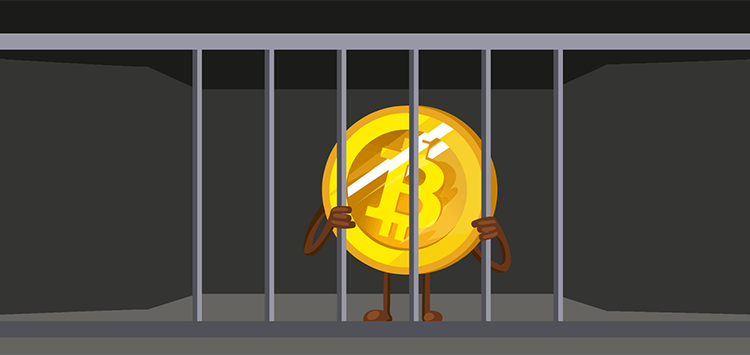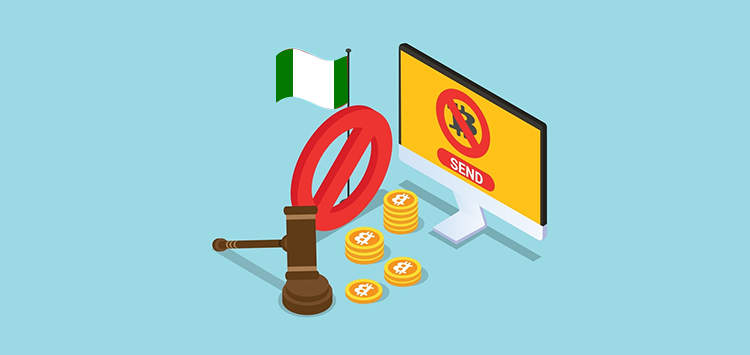In 2021, we witnessed what would be later described as a ‘war’ on cryptocurrencies, and the CBN ban on crypto was more than a big story. Some financial watchdogs worldwide issued stern warnings; others banned the use of cryptocurrencies. Many described the asset class as too volatile and warned that participants are not protected in the event of a loss.
Although there have been warnings on the use of cryptocurrencies by financial watchdogs since 2012, they had a keen interest in the industry in 2021.
Case studies
A significant move came from China – a country known to control over 50% of the mining power on the Bitcoin network moved to outlaw the use of cryptocurrencies completely and mining of cryptocurrencies.
The move by China came at a time when Bitcoin and other altcoins took a significant nosedive of over 50% for the third time in 4 years. We saw Bitcoin crash from around $64,000 to trade as low as $30,000 in a day, representing one of the most significant liquidation events seen in the cryptocurrency space to date.
We have seen the Financial Conduct Authority (FCA), the United Kingdom’s financial watchdog, also issue warnings on the use of cryptocurrencies. A notable move by the financial watchdog seen in 2021 was the total ban of one of the world’s largest cryptocurrency exchanges, Binance. The move, at the time, was regarded as one of the most significant moves any global regulator had made against Binance Exchange.
Also in the United States, the SEC, run by Gary Gensler, brought a total of 21 cryptocurrency enforcement actions. 13 of the 21 cryptocurrency enforcement actions (61.9%) included an allegation of fraud.
Asides from that, cryptocurrencies were an important topic of discussion in the U.S. Senate, as Senator Elizabeth Warren made a name for herself, with many in the cryptocurrency space calling her the ‘crypto witch’, because of her outspokenness and negative bias towards the industry, particularly about the use of stablecoins and its potential systematic risks.
In Nigeria, the Central Bank of Nigeria (CBN) banned cryptocurrencies on February 5, 2021. The CBN released a ruling that ordered all financial institutions to stop facilitating crypto transactions and desist from transacting with entities engaging in crypto. The statement also instructed all banks and financial institutions to close accounts of individuals or entities engaging in this type of transaction.


Further to earlier regulatory directives on the subject, the Bank hereby wishes to remind regulated institutions that dealing in cryptocurrencies or facilitating payments for cryptocurrency exchanges is prohibited. Accordingly, all DMBs, NBFIs and OFIs are directed to identify persons and/or entities transacting in or operating cryptocurrency exchanges within their systems and ensure that such accounts are closed immediately.
CBN, 2021
The Consequences
The decision by the CBN was and is still criticised by cryptocurrency experts and enthusiasts, especially because Nigeria, at the beginning of 2021, was leading the adoption of cryptocurrencies in Africa. According to Chainalysis’s crypto adoption 2021 report, Africa’s cryptocurrency market grew over 1200% as of June 2021, with Nigeria as the front runner.
However, according to Chainalysis’s report on Global Crypto Adoption Index, Nigeria now comes in second, with Kenya leading Africa’s cryptocurrency adoption. According to the list, Kenya came in 5th while Nigeria came in 6th.
Kenya has Nigeria beat in the on-chain value received and on-chain retail value received; however, Nigeria outperforms Kenya in terms of P2P exchange trade volume.
Chainalysis, 2021
The data revealed that the CBN ban had a significant effect on adopting cryptocurrencies. The barrier of entry became harder as people could only participate in the market through the P2P market, which majorly operates on the price mechanism of the black market, which is unregulated by any financial watchdog.
With the increased participation in the black market, it reveals that Nigerians, who are participating in the cryptocurrency market, are paying a premium, way above the actual exchange rate laid down by the CBN. In fact, the P2P market price is more than the price seen with local Bureau De Change (BDC) operators who deal in physical exchange of foreign currency for cash, also outside the purview of the CBN.
Despite the ban, P2P transactions have flourished in Nigeria, even with the high premium cost and risk associated with it. According to data from Useful Tulips, Nigeria currently has a P2P volume of $400 million on two major platforms (Paxful and Localbitcoins), followed by Kenya with more than $160 million, and South Africa with $117 million. This indicates a growing interest in the space and the willingness to participate in the industry by the Nigerian people.
From the uptick seen in P2P transactions, it is evident that the CBN ban has helped contribute to the existence of the black market, a market which the CBN had attempted to combat last year, with the attack on AbokiFX, which the CBN governor; Godwin Emefiele, accused the website of “illegal activity that undermines the economy,” and the discontinuation of sales of dollars to BDC operators.
Due to a high level of interest from the Nigerian people and the ban, Nigerians are looking for ways to participate. As the interest grows, the more significant these unregulated P2P markets and black markets become.
Nigeria is drawing behind the world


Although the industry faced criticism, we still saw big economies embrace them. India, for instance, was on the verge of banning cryptocurrencies in 2021 but having seen the potential, the Indian Finance Minister Nirmala Sitharaman announced a 30% tax on any income from the transfer of virtual digital assets.
Towards the tail end of 2021 and at the start of 2022, there were rumours of an executive order coming from the Biden administration which many feared would potentially hurt the cryptocurrency industry in the U.S. However, the fears turned out to be unwarranted as the executive order instructed various U.S. government parastatals to find ways to ensure the U.S. continues to lead in the adoption and innovation of blockchain technology and cryptocurrencies in the world.
The European Union (EU) has also taken steps towards cryptocurrency regulation. The EU is moving to put in place laws that regulate the industry, which indirectly legalises and recognises cryptocurrency-related transactions and mining.
As at this time, the EU’s regulatory framework for governing crypto assets passed another threshold and is on its way to ratification as the EU parliament’s Economic and Monetary Affairs Committee voted 31-4 in favour of a new draft of the Markets in Crypto Assets (MiCA) framework, with 23 abstentions.
Seeing that other nations are doing their best to ensure that the cryptocurrency market is safe and free from harm to participants, I think it is safe to say that Nigeria needs to do the same. With the growing rate of cryptocurrency adoption, if the Nigerian financial watchdog fails to act now, Nigeria could potentially be left behind in the technological advancement that Distributed Ledger Technology (DLT), has to offer.
Although the government has launched its own Central Bank Digital Currency (CBDC), it is not enough because the power of the CBDC does not compare to what the cryptocurrencies have to offer. It is unlikely that participants will pivot from cryptocurrencies to CBDC.
Expert opinion on how cryptocurrency can help boost the Nigerian economy
Adetayo Adesola, a Crypto Marketing Specialist, focused on how blockchain technology alone can be a game-changer for the economy. He stated, “My perspective here is quite simple. Let’s step away from cryptocurrency and focus on blockchain and the advantages it provides through open-source and decentralised technology to critical areas of the economy and how this can help boost the effectiveness of specific sectors like trade, for example; the port system and perhaps real estate with the issuing of Certificate of Occupancy. Despite these clear advantages, not all industries will function better with blockchain.
“Then when we go a step back to address the form of cryptocurrency as we know it in Nigeria. There are instant economic benefits. I will argue there are already benefits with employment and FCY remittances, with many young people being paid in dollars. Banks can benefit from processing cryptocurrency transactions from a macro scale even with a higher transaction fee. Nigeria has a reported peer-to-peer volume of $400 million across just two exchanges. Think of how these transactions will affect the bottom line of Nigerian banks from an e-banking perspective.”
In a conversation with Ajibola Lawal, a DeFi specialist at Kaicho Digital Assets, on how Nigeria’s economy can benefit from the industry, he explained that remittance is a good benefit for the economy. Other areas in the blockchain world like NFTs, can also be beneficial to the economy.
He explains that “Straight out of the gate, remittances are always the first go-to when talk of the benefits of crypto comes up. And, there’s good reason to believe that this is a valid benefit. The reduced fees and ‘borderlessness’ of crypto payments cannot be overstated.
“However, this is barely scratching the surface as the benefits crypto and its underlying technology offers stretch far beyond its financial applications. There is a myriad of easily applicable use-cases from Land Title ownership issues (which would involve issuing land titles as NFTs) to supply chain assurance.
“Now, given the current state of faith in counterparty entities, our society offers the perfect sandbox to watch, learn and experiment at the cutting edge of innovation. It is the same reason we developed one of the most advanced, fast and secure local transfer systems in the world — that opportunity given to innovation to find the path of the most value and efficiency.”
Ajibola Lawal
Olumide Adesina, an analyst at Quantum Economics, focused on the job opportunities the industry can provide to Nigeria’s high unemployment rate.
He noted that “the crypto industry is experiencing a steady increase in job opportunities as Nigeria’s unemployment rate soars. There are opportunities for young people, even if they’re drawn from a relatively small base so far, as more institutional investors pump money into the market, bringing new funds and new companies.
“Furthermore, educators, forensic experts, journalists, lawyers, presenters, programmers, reporters, researchers, local blockchain and crypto authors, software developers, writers, and others have emerged, thus creating an ecosystem of innovation, collaboration, and growth.”


Hear us out
Cryptocurrency adoption has been proven to help countries’ economies grow and El Salvador is the primal example of this.
The Latin American nation whose GDP is largely dependent on remittances from abroad adopted Bitcoin as legal tender and through the government issued application, Chivo, the people of El Salvador can now receive remittance from the comfort of their homes.
El Salvador is a nation with approximately 6.5 million people according to the World Bank and before the adoption of Bitcoin as a legal tender, only 30.4% of the adult population of the nation have a bank account, leaving 69.6% unbanked.
The president of El Salvador, Nayib Bukele, on the adoption of the government-issued wallet, stated that three million Salvadorans are now using the Chivo wallet. This means the Chivo wallet has banked 46.15% of Salvadorans in less than a year, a feat that the traditional banking system has failed to achieve.
The President also mentions that $1 million in remittances is being received every day through the Chivo wallet with 65,437 transactions being processed every second.
Also, we are seeing the adoption of Bitcoin benefitting developed economies like the United States, Canada, etc, and developing nations like El Salvador and Brazil.
Indeed, the use of cryptocurrencies brings a staggering potential that Nigeria’s economy can benefit from if only the nation embraces it.






